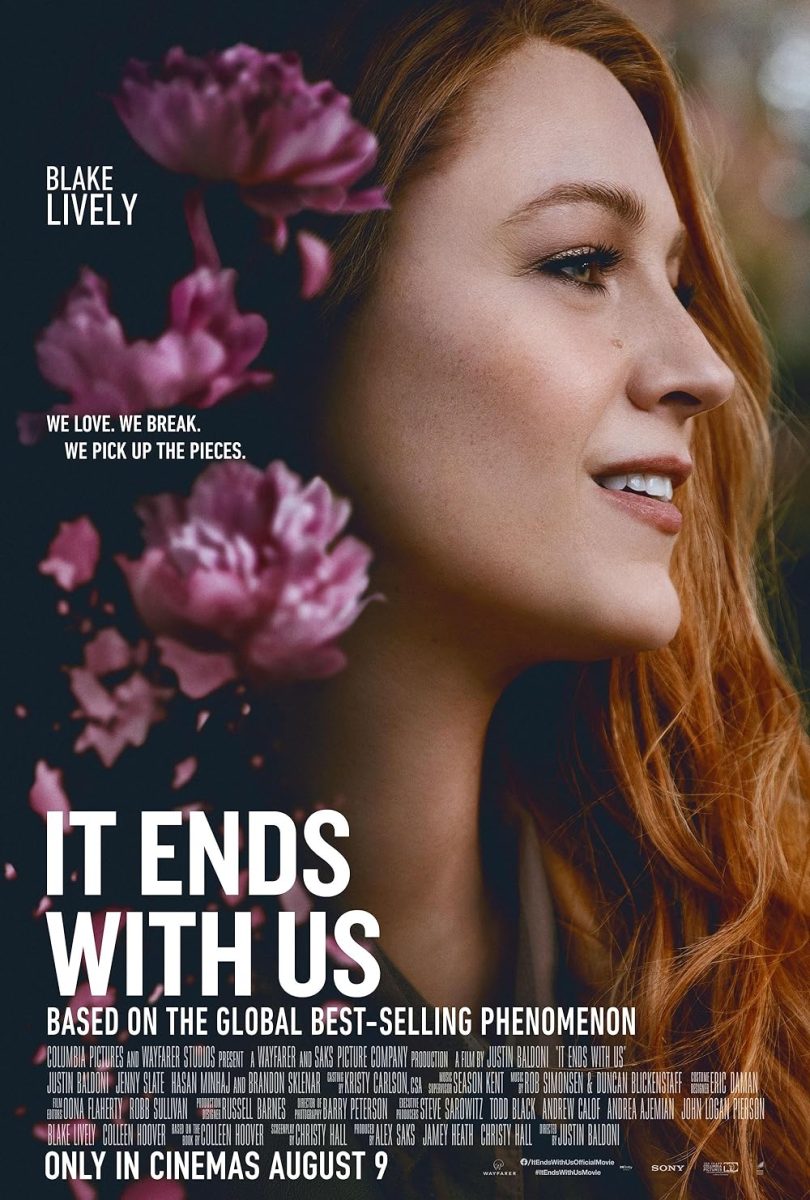Editor’s Note: This piece contains mentions of domestic violence.
Author’s Note: I would like to preface this article by saying that in no way, shape or form do I wish to diminish the subject of domestic violence. As someone who has fortunately never had to extricate herself from an abusive relationship, I recognize that I cannot fully understand the hardships involved, and I know that every person’s experience is different. That being said, my goal within this article is to express my feelings on how “It Ends with Us” falls flat in giving any sort of gut-wrenching or nuanced takes on the subject.
To all of my fellow Vanderbilt students and bookworms, we all knew that it was only a matter of time before one of Colleen Hoover’s novels was optioned for the big screen. The rights to “It Ends with Us” were purchased by actor and director Justin Baldoni and his production company, Wayfarer Studios. Actress Blake Lively joined the project as a producer and also stars as the leading woman, Lily Blossom Bloom (yes, that’s her real name). Eventually, it was also decided that Baldoni would direct in tandem with playing Ryle Kincaid, Lily’s abusive partner.
Author Colleen Hoover has permeated the literary scene since 2021, rising to fame via BookTok with hits such as “It Ends with Us,” “Verity” and many more. Even as I sit in a coffee shop writing this piece, a woman a few feet away from me holds a Hoover novel in her hands. Titles litter the bookshelves of my friends and sister, and I admit that while I am not a “CoHo” stan, I’ve dabbled in a few of her titles — mainly for field research purposes. Known for her illustrious romance plots and digestible storylines, Hoover has established herself as the Taylor Swift of the literary world, and her fans even act like the most rabid of Swifties, vehemently defending her at every turn. I find Colleen Hoover to be the fast fashion brand of the publishing industry — cheaply made and ultimately forgotten after one or two wears.
I must admit that I never intended to see “It Ends with Us.” My friends, including one who is a hardcore Colleen Hoover fan, convinced me to, and I justified it saying that it could be good for journalistic purposes. I did read the book, but I felt like that was enough for me. I gave it four stars on GoodReads.
“Some parts of the story felt rather predictable, but the overarching themes were extremely touching and shed light on domestic violence victims that we don’t normally get,” my review read. “The fact that Hoover draws on personal stories from her own upbringing in this book is also commendable.”
My overarching opinion of the film also aligns with this statement — however, the movie was somehow far worse.
For those who are unaware, “It Ends with Us” follows Lily Bloom (Lively) as she moves to Boston to open her dream flower shop, fittingly named Lily Bloom’s. Along the way, she meets the charming and broody neurosurgeon Ryle Kincaid (Baldoni). Lily and Ryle have what appears to be a perfect relationship, but once they are married, Ryle’s darker side comes out. After discovering that she’s pregnant, Lily must decide whether to leave or stay. Let’s also throw in the fact that her first love, Atlas Corrigan (Brandon Sklenar), also lives in Boston and is still in love with her, and Lily is probably in love with him, too.
There are many layers to this film, most pointedly the generational cycle of abuse in Lily’s family. Her father abused her mother, and while she vowed to never be like her mom, Lily ends up in the same situation. Additionally, the film doesn’t exactly paint Ryle as a villain. The whole first hour of the film is intended to read as a romcom (and not a good one, at that). As the story unfolds, the audience learns more about Ryle’s background and childhood, an attempt to perhaps explain why he is the way he is and render him a more sympathetic character, but his abusive behavior is inexcusable. In short, “It Ends with Us” attempts to have viewers fall in love with Ryle, just as Lily does, so that we are just as shocked and dazed as she is when the abuse begins. However, the film fails in this endeavor, so the intended impact becomes moot and difficult to grasp.
I know that the screenwriter for “It Ends with Us” was Christy Hall, but the movie feels like it was written by an AI interface that was allowed to comb through only the cheesiest and darkest millennial depths of Wattpad for referential content. What is supposed to be a “meet-cute” between Lily and Ryle on the roof is an excruciatingly painful watch. Everyone in the theater where I saw the movie was laughing at multiple points throughout the film that were not supposed to be funny. My personal favorite was the scene with Lively in the fishnets (if you know, you know). The dialogue didn’t seem heartfelt — it all read as one large, rose-tinted SNL skit of a rom-com.
In addition, I would love to have a word with the music supervisor of this film. There is something to be said about using well-known music in a film — it’s acceptable sometimes, but when there are crucial and emotionally heavy scenes, using incredibly popular music simply takes you out of the story. When young Lily (Isabela Ferrer) and young Atlas (Alex Neustaedter) have a romantic moment, “Skinny Love” by Birdy plays over it. I just couldn’t take that seriously — it also only increased the Wattpad-ness. What really did it for me, though, was the use of Lana del Rey’s “Cherry,” which Lively even admitted she had to fight for, and Taylor Swift’s “My Tears Ricochet.” Sorry if it sounds dramatic, but I slammed my hand on my tray table and facepalmed. Unless it’s “Welcome to New York” in a cheesy montage, I don’t think you can tastefully place a Taylor Swift song in a movie. It untethers the viewer from the reality in which they are supposed to be immersed — especially when that “reality” is a montage of Lily Bloom having flashbacks to the instances of domestic violence that she faced.
While the overall plot of the “It Ends with Us” novel didn’t give the film’s creative team a great skeletal structure to work with, there was absolutely a missed opportunity to take the topic of domestic violence and dive into the legitimate emotional complexities of it. The film does not provide any indication that Lily struggled to choose to leave Ryle, and she was incredibly lucky that people were in her corner (including Ryle’s sister, who doubles as Lily’s best friend). She’s also lucky that Ryle never tried to harm her once she left their apartment and moved back home. This isn’t the case for everyone, and “It Ends with Us” paints the most optimal version of these situations.
Perhaps I’m being too much of a cynic in my critiques, but the compounding elements surrounding Lily and Ryle’s relationship cheapened the story and brought it into Lifetime movie, soap opera territory instead of something that had the potential to be grand. This is similar to how Baldoni is using the press tour to comment about domestic violence awareness whilst Lively is seemingly promoting her new hair care line (that doesn’t include conditioner) and talking about the new “Deadpool & Wolverine” movie.
If the whole team were more dedicated to bringing truth to “It Ends with Us” instead of branding it as “Lily is such a girl boss,” then I’m sure it would have been worth more of my time. With the potential sequel, “It Starts with Us,” in the works, I truly hope that it is made in a more honest way — otherwise, it’s better left unmade.
If you or anyone you know needs help, resources like the National Domestic Violence Helpline can be reached at 800-799-7233, and you can contact Project Safe Vanderbilt at 615-857-0660.



